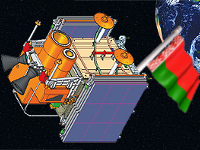Belarus highly enthusiastic about launching its first 'squirrel' into space
A Russian rocket that blasted off from Baikonur cosmodrome on July 22, took the first Belarusian satellite into space. The satellite is called BelKA: the word 'belka' translates from Russian as 'squirrel.'

The appearance of the Belarusian satellite in space is a political, rather than a technological or a scientific phenomenon. Now that Belarus has its own satellite, the republic has become a space power. However, Belarus had to try twice to do that, not to mention the fact that BelKA was made in Russia.
The first launch - also from Baikonur - was conducted on July 26, 2006. The launch failed because of technical problems with the Dnepr booster rocket. The rocket engines were shut down during the 73rd second of the flight. Fragments of the rocket with satellites on board fell into the desert in the south of Kazakhstan. Fortunately, no one was hurt. An Emergency Committee was formed to investigate the reasons. The committee conducted the investigation under the supervision of Belarusian President Alexander Lukashenko, who had attended the launch. It was revealed that the accident was caused with a malfunction of the hydraulic drive of the fourth first-stage engine.
The current launch went smoothly. BelKA satellite (or BKA - the initials stand for Belarusian Spacecraft) was built by the order from the National Academy of Sciences of the Republic of Belarus and the Russian Research Institute of Electromechanics named after Iosifyan. The basic equipment was manufactured at Belarusian plant "Peleng"; auxiliary equipment was delivered from Russia and the UK.
BelKA is designed to last for five years; it weighs about 400 kilograms (a half of the weight is the optoelectronic equipment, manufactured by Peleng and the Institute of Cybernetics of Belarus). The satellite's orbit is circular, sun-synchronous, with 506 km of altitude. BelKA has a high dynamic performance. It is a maneuverable craft that can quickly change its course in orbit to capture images at a desired angle. It is planned that BelKA will provide the complete space coverage of the territory of Belarus. It will fly around the entire Earth in 24 hours, not to mention its tiny "homeland." Therefore, the spacecraft will provide most expeditious data.
The pictures taken by the spacecraft, will provide an opportunity to analyze the objects on the earth's surface with a very high resolution. This means that the Belarusian Hydro-Meteorological Center will finally get detailed information about the floods of the rivers, the state of crops, the snow cover, etc. More importantly, this will be the information that Belarus will own. For the time being, Minsk buys these data from Russia and America. Moreover, in addition to substantial cost savings, BelKA will give Belarus another financial advantage. After all, one can sell high-resolution images to others.
Although the launch has just taken place, the republic does not have the reputation of a space power, of course. However, the country already has a number of customers willing to buy its space images. It goes about Azerbaijan, Venezuela and some other countries, which news agency BelTA did not disclose for some reasons. Reportedly, Belarus may start selling satellite imagery as early as this week.
Belarus is extremely happy about the successful launch. "The launch of the satellite does not only elevate our country to the rank of a space power, but also becomes an excellent reference for students to achieve new goals and acquiring new knowledge ... The launch may be put even more ambitious goals in expanding the country's participation in space programs," BelTA quoted Minister of Education of the Republic Sergei Maskevich as saying.
The head of the Center for Information Technologies of the Belarusian State University Yuri Vorotnitsky said that the launch of the satellite demonstrated the signs of the development of the country's cutting-edge high-tech industries, particularly "most advanced aerospace technologies."
The word 'technology' is probably the most popular one in the Belarusian media now. The main thing now is to have these technologies working in practice.
Andrei Mikhailov
Pravda.Ru
Subscribe to Pravda.Ru Telegram channel, Facebook, RSS!


